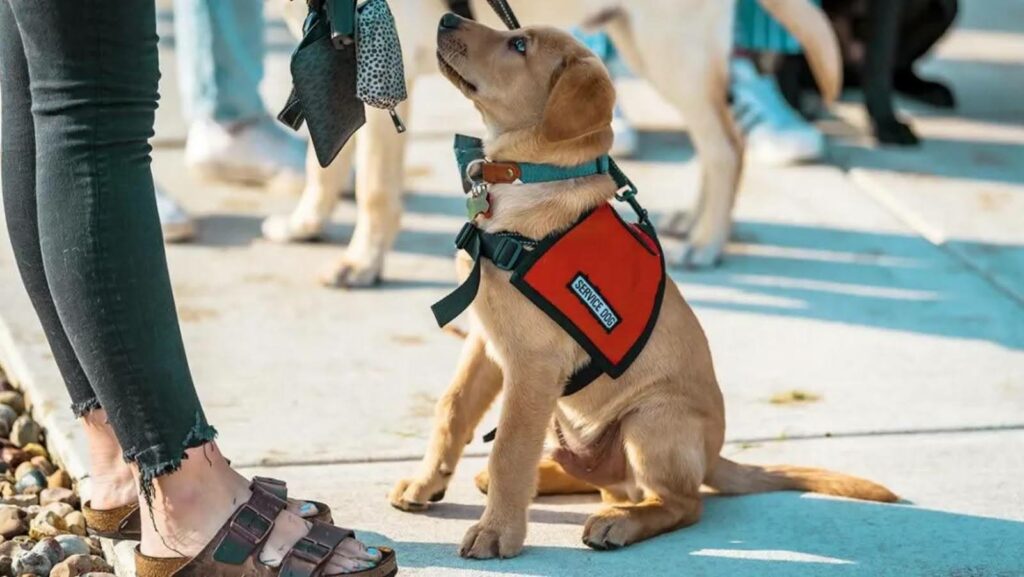
Addiction, or substance misuse disorder, is a disability that causes an individual to have an intense urge to use a substance (or engage in a particular behavior) repeatedly despite its harmful effects on their life.
Service dogs provide immeasurable support to individuals with disabilities, and that includes those with substance misuse disorder. They can improve their emotional well-being, provide a sense of consistency and security, and perform tasks that help to reduce the chances of a relapse.
If you believe a service dog will help you with your addiction, then you likely have a lot of questions about what their role specifically is and whether you’re eligible for one. We’ll answer these questions below to give you a clear idea of whether a service dog is right for you.
What Is a Service Dog?
A service dog is a type of assistance dog that has been specifically trained to perform tasks that help to mitigate the symptoms of a disability.
Service dogs can assist with sensory, emotional, physical, and mental disabilities, and they go through rigorous training to ensure they can perform their trained tasks reliably and effectively.
Can I Get a Service Dog for Addiction?
A common misconception is that individuals with addiction do not qualify for a service dog. This misconception is rooted in the belief that addiction isn’t a disorder and is instead the result of a person being simply unable to “control themself.”
This misconception is harmful and couldn’t be more true. No one “chooses” addiction, and science has shown that the brain changes significantly with addiction and stops functioning as it should.
Substance misuse disorder is also officially recognized as a disability under the Americans with Disability Act (ADA). This means that those with addiction can qualify for a service dog, provided that they meet all other qualifying criteria. This leads us nicely to our next point:
How Do I Qualify for an Addiction Service Dog?
To qualify for an addiction service dog, you must have been officially diagnosed with substance misuse disorder and currently be in recovery.
You must also arrange a consultation with a licensed healthcare professional. They will assess your eligibility, and if they feel an addiction service dog is the right treatment for you, they will provide you documentation asserting that you require a service dog’s assistance.
During the consultation, you must be able to show that you will benefit from a service dog’s specially-trained tasks. You must also be able to show that you can properly care for a service dog and have an active role in their training.
What Tasks Does an Addiction Service Dog Perform?
An addiction service dog can perform a variety of tasks to help those battling addiction, with most tasks aimed at helping to ease distress and minimize the chances of a relapse. Some examples of tasks an addiction service dog can perform include:
- Deep pressure therapy to help ease their handler’s anxiety or stress
- Interrupt and redirect their handler’s attention to help prevent relapse
- Guide their handler away from areas where the substance is present
- Tactile stimulation to keep their handler grounded
If you’re mainly considering a service dog for emotional support rather than for their trained tasks, then you may want to consider an emotional support animal instead.
What Is an Emotional Support Animal?
An emotional support animal is another type of animal that can be prescribed to an individual with addiction. The main difference is that emotional support animals do not perform trained tasks. Instead, they ease the symptoms of substance use disorder through their presence, affection, and the companionship they provide.
Any species can become recognized as an ESA, including animals like fish, reptiles, cats, and hamsters. ESAs are also protected under the Fair Housing Act, meaning they have the right to live with you in rented properties that usually forbid pets.
How Do I Get an Emotional Support Animal for Addiction?
Emotional support animals are ideal for those with addiction who require comfort, companionship, and reassurance in their day-to-day lives.
You can learn about whether you qualify for an ESA and how to go about getting one for your disability by using the emotional support animal registration system from US Service Animals. US Service Animals also has a team of ESA legal experts who can answer any queries or concerns you may have.














